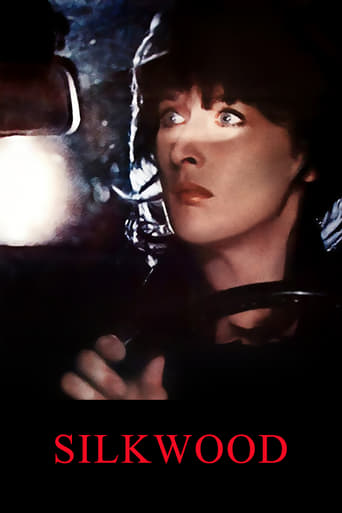Lechuguilla
The plot of "Silkwood" is fairly close to my memory of major events as they played out in Oklahoma, and reported by local news over multiple weeks. A lone individual up against a big corporation is always a compelling story. In this case, the individual, Karen Silkwood (Meryl Streep), proved morally superior to Kerr-McGee, even though the story ends tragically. This film is unusual in that the plot and characters are not exaggerated at all.Quite aside from the film's deep political and social themes, "Silkwood" excels at a personal level. All the characters are real people, and the script and actors convey deep and meaningful characterizations. This is true even of secondary characters like Thelma (Sudie Bond) and Mr. Hurley (Bruce McGill), for example. These peoples' lives are all rather common and dreary, but what a welcome change from the contrived and two-dimensional characters in most films.Detailed production design matches the dreariness and bleakness of these blue-collar workers in rural America. The naked light bulb that hangs from the ceiling in Silkwood's house; the drab green paint peeling off kitchen cabinets; that old beat-up white car Karen drives. On and on, the settings are realistic and appropriately depressing. The low-key, country/banjo score amplifies the realism of time and place, as does the old gospel hymn "Amazing Grace".Casting is ideal. I don't know how the acting could have been improved. Meryl Streep just disappears into the role of Karen Silkwood. Both Kurt Russell and Cher deserved awards. Even minor roles are well cast, and the performances are terrific.Color cinematography is quite good. Night scenes, both interior and exterior, are impressive. There's one scene in the second half where Karen and Dolly (Cher) sit out on the front porch in a swing; it's night; Dolly is crying and Karen reassures her with a soft version of the song "Hush-a-bye, don't you cry, go to sleep little baby, when you wake…". As the camera backs away, we see that drab, lonely house with a melancholy Karen and Dolly, an image that is powerfully haunting."Silkwood" conveys a highly realistic, true-life story about a very ordinary young woman who, despite personal issues and imperfections, takes big risks to do what is morally right. The film is sad, depressing, and very well made. It easily ranks among my twenty best films of all time.
michael_the_nermal
Warning! Spoilers ahead!This film is but one of a series made in the early 1980s that dealt with issues of social change and individuals dealing with overwhelming odds against powerful oppressors. Among earlier epics like "Reds" and "Gandhi", "Silkwood" is perhaps the most relatable to the average individual, and thus perhaps the most poignant. Unlike the protagonist of "Reds," Karen Silkwood is not an upper-class do-gooder out to change the whole world from the outset; she is an ordinary laborer in a nuclear materials plant who becomes a social crusader due to the hazards of her workplace on both herself and her coworkers. Also, unlike "Gandhi," "Silkwood" is subdued and limited in scope, the setting being limited to rural Oklahoma and the nuclear materials plant; the characters are not nation-builders or viceroys, but workers, union leaders, managers and reporters. Mike Nichols's film about Karen Silkwood, while being comparatively humble, is no less heartbreaking and gripping.Meryl Streep is excellent as the eponymous protagonist. Unlike John Reed in "Reds", Karen Silkwood is of the same class and temperament as the people she is trying to save. She playfully steals coworkers' food in the cafeteria, laughs at their crude jokes, and chides her roommates--also employees at the company--for keeping spoiled food in the refrigerator. Because Silkwood is close to the people she works and lives with, she is particularly distraught when she learns about the plant's contamination and watches as a coworker is given a brutal bath to rid her of irradiation. She understands them as John Reed never could. Some critics have characterized the character of Silkwood as equally obnoxious and irrational as she is noble. Silkwood is a back-slapping blue-collar woman like everyone else in her life, but Streep is able to make these traits endearing rather than annoying. It is Silkwood's personality which makes her hated by coworkers and company later in the film, even though members of the audience get the sense that *anyone else in the plant* could have ended up like Silkwood if they had chosen her path. The audience feels, for the most part, sympathy with the tribulations of Silkwood rather than distance, and this is to Streep's credit. It seems fair to fault the movie for getting sidetracked in the first hour or so with stories about Silkwood's relationship with her boyfriend and roommates, as well as her painful relationship with her divorced common-law husband and her children. While, on the surface, having little to do with the main plot about Silkwood's fight against nuclear plant corruption, these vignettes are nevertheless important in building and developing Silkwood's character, such that she is fully three-dimensional and sympathetic when the main plot starts rolling. Unfortunately, these early scenes may be distracting to the first-time viewer, so much so that they may lose sight of what the movie is about, and might turn off the TV (or monitor) in frustration because the first third is boring and doesn't seem to go anywhere plot-wise. A fair warning: "Silkwood" is as much about the emotional interactions between three roommates in a small house as it is about workplace safety; these plot points *do* eventually join together, but it requires patience on the part of the audience.While Meryl Streep portrays Silkwood as a gutsy, fearless individual, the movie treads carefully between hagiography and castigation. The movie does not ignore the toll SIlkwood's fight against the company has on her roommates and, more significantly, her coworkers, who show understandable concern that her sleuthing will only result in the company shutting down and everyone getting laid off. While those around her change in their attitudes toward Silkwood, Silkwood, remarkably, remains a static character, as boisterous and playful near the end as she was in the beginning (a near-finale scene with her boyfriend as she departs for the last time shows this character development). "Silkwood" is a fine piece of filmmaking about a true working-class hero. Meryl Streep deserves credit for making Karen Silkwood a likable and compelling protagonist, who in lesser hands may have come off as annoying. While unsung today, "Silkwood" remains one of the best of the "social cause" movies of the 1980s. Highly recommended.
sashank_kini-1
Silkwood is one of those movies that you simply should not watch at midnight. Unfortunately, my cable television placed the movie at the 12:30 am slot and on top of it kept no intermissions, not even one during the movie. So I had to stay awake late at night and watch this in the living area, dimming the lights around me and lowering the T.V.'s audibility so that my family would not get disturbed by the warning alarm sounds heard often in the film. Without any intermissions, I was a little lost during the movie because keeping an intermission during films does indeed have a powerful impact if placed at the right point – it increases the audience's anticipation and also gives them a break to take in all the details.Silkwood kept chugging on and on in scenes with little dramatic weight (its documentary approach is quite like the lead actress Meryl Streep's other film A Cry in The Dark) or any significant narrative development to hold us in. I quite felt like the movie chose the wrong person to tell its story, and it could've been told better had Karen Silkwood been a supporting character in a film that rather emphasized on the investigation of Kerr-McGee plant and the lawsuit in the aftermath of Silkwood's untimely demise. Unlike Erin Brockovich, Silkwood was not able to directly resolve the issue of health and safety of workers, and though she did play a major role in initiating the whole move, her accident martyrs her for a greater cause. The movie isn't able to deliver her enough justice for her efforts and death, with its epilogue only mentioning that the 'plant closed down a year later' – too grim and defeated to inspire. Karen Silkwood was a courageous small-town gal who took on the Oklahoma nuclear plant where she worked after finding out that it conducted unethical practices without considering workers' safety. From being one of the bubbliest and most beloved persons among her colleagues and supervisors, Karen eventually lost almost everyone's support after helping the union in digging out such malpractices happening at the workplace. Her private life too faced its share of difficulties on top of the mess she was already in even before the incident – apart from losing custody of her three kids, Silkwood's relationship with her boyfriend Drew also suffered when he cautioned her of 'going too far' with the case. She didn't just have to win her colleagues' support but also prove to the union that she was a smart woman with a sharp mind.In one of the film's best acted scenes, Meryl as Karen is discussing recommendations and proposals for the nuclear plant with the senior union members. At first, her suggestions are trivial and her seniors condescendingly put down her ideas and hurriedly begin to leave. It is then that Karen leaves the room and catches them in the corridor where she whispers what she had witnessed at the plant. It is only then that the union takes her seriously. Streep's excellence is evident during close-ups or mid-shots in this movie's case (the film rarely has close- ups), but her screen charisma tends to disappear in her attempt to replicate human-like performances. And this becomes a problem whenever the camera goes away from her, especially here in Silkwood where the cinematography is quite conventional like those old films where the cameras moved less and the actors went back and forth. She's managed to rectify this problem though especially in her recent ventures where her charisma makes for half the performance. Here we manage to catch less than half of whatever she is doing because of the distance the camera maintains.It's not just Streep but also actors Cher, Kurt and director Mike Nichols who act and direct respectively in a similar manner. Now I get it they wanted to depict a dull small-town in Oklahoma with as much truism as possible. Cher (playing Karen's lesbian friend Dolly) wears the most unimposing crumpled and faded jerseys and pants while Russell (playing Karen's boyfriend Drew) is equally untidy and moves around the house shirtless and in cheap blue jeans (though their performances are great). They do everything in their own lazy pace and Cher's Dolly is found half the time either in bed or on the couch. On top of this Nichols makes it even more evident that nothing much happens in 'small town Okie' by placing his camera at a distance. Only a few times do we get shot/reverse shots between the actors and once or twice we see the camera do an effect other than cutting (a few dissolves and an expected fadeout after the crucial scene). Even the upbeat background music at the beginning slowly turns into bleak mournful tunes as the film progresses. It is only the sound of the warning alarm bells that occasionally appear to raise some momentum. There is neither enough follow-up of Silkwood's investigation itself, except for some extended scenes of Karen surreptitiously (hence very slowly) hunting for some 'confidential information'. I could get up in between, bring some chocolates from the fridge in the kitchen and find myself watching her do the same action. The movie 'Silkwood' therefore becomes 'ambitionless' and although I do understand it has deliberately downplayed its 'own cinematic ambition' just to honor the woman's life, the movie as a result also becomes 'one of those inspirational films that come, snag some awards and are soon forgotten'. Or in this film's case, used as a failed 'boob-gag' in Seth MacFarlane's unimpressive Oscar show.
rpvanderlinden
"Silkwood" is not a paranoia/expose thriller like "The China Syndrome", as I had expected. Although those elements are present "Silkwood" moves in other directions. It's a wonderful movie, a rich, vivid, detailed, heartfelt portrait of a woman, activist Karen Silkwood, and her world. Because of the wide scope of the film and Meryl Streep's portrayal of Silkwood I'll temper my description of her as simply "activist" and add: Woman. Worker. Housewife. Friend. Lover. Fighter. More words will come to me. The film's portrayals of the myriad of people in Karen Silkwood's personal and working lives, are acute and incisive, and its evocation of a time and place, 1970's Oklahoma and Texas, is a tapestry of many colours, a sympathetic but non-glamorization of working class lives, a penetrating look at the ups and downs of love, plus a panoramic view of an arid landscape fouled by heavy industry as far as the eye can see.It's wonderful to see a film that delves so deeply into the lives and personae of its characters. They don't behave the way we expect or even want them to. Silkwood works at a plant which handles plutonium and where white collar management is breaking the law and exposing its blue collar workers to dangerous levels of radiation. The villains are flesh-and-blood people who, themselves, are acting as they do because of real pressures and are the purveyors of established corporate survival instincts. The end justifies the means. Even many of Silkwood's co-workers are against her, fearing for their livelihood. This is not an environment where the workers possess many bargaining chips, and the company holds the trump card - it can pick up and move elsewhere. The film's depiction of the affair between Silkwood and her lover, Drew (Kurt Russell), is special, indeed. The deep well of love they have for each other starts to deteriorate as Silkwood morphs into a self-actualized human being moving into a wider world. The relationship she has with Dolly (Cher), a gay woman sharing her home, is touching and quite lovely.As I write this review political discourse is becoming increasingly antagonistic and the political mood is lurching to the right. Public unions are in danger and people are encouraged to respond to bogus threats and think in opposition to their own self-interest. Isn't this, essentially, what "Silkwood" is about? The pervasive climate of fear? "Silkwood" is not about heroines but about human beings caught in an untenable situation over which they have no control and few resources at their disposal. With the end result in doubt and her safety in jeopardy Silkwood does not leap over tall buildings, but she does the best that a human being can do. That's where the film achieves its profundity. It's the best kind of film, one which deals, in a meaningful way, with the human experience.






